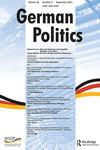The Austrian-German Relationship in EMU Reform: From Asymmetric Partnership to Increased Independence
IF 2.1
3区 社会学
Q2 POLITICAL SCIENCE
引用次数: 1
Abstract
The relationship between Austria and Germany is characterised by many political and cultural commonalities and strong economic interdependencies. Moreover, the asymmetry between the two countries, both in terms of economic size and political power, has long time characterised the relationship as one between ‘leader’ and ‘follower’. Yet, despite these strong ties, Austria has assumed an increasingly independent role in recent EMU politics. Therefore, this article asks whether and why the close partnership of the two countries is slowly growing apart. Based on the analysis of three periods of EMU reform, the article shows that Austria followed Germany during the fast-burning phase of the euro crisis (2010–12), became more self-reliant in its slow-burning phase (2012–16), and even opposed German positions in post-crisis reform (2016–20). Converging economic preferences and the strong power asymmetry between the two countries can explain Austria’s cooperative strategy until 2016. By contrast, Austria’s shift from loyal followership towards more pronounced independence is largely caused by domestic developments. The reluctance of the Austrian government to share risks and build joint capacities in EMU reflects a Europe-wide trend, as an increasing ‘constraining dissensus’ at the national level makes it difficult for small state governments to compromise at the European level.EMU改革中的奥德关系:从不对称伙伴关系到日益独立
奥地利和德国之间的关系具有许多政治和文化上的共同点以及强大的经济相互依存性。此外,长期以来,两国在经济规模和政治权力方面的不对称性一直将两国关系描述为“领导者”和“追随者”之间的关系。然而,尽管有这些牢固的联系,奥地利在最近的欧洲货币联盟政治中扮演着越来越独立的角色。因此,这篇文章问,两国的密切伙伴关系是否以及为什么正在慢慢疏远。基于对三个时期EMU改革的分析,文章表明,奥地利在欧元危机的快速燃烧阶段(2010-2012年)追随德国,在缓慢燃烧阶段(2012-2016年)更加自力更生,甚至在危机后改革中反对德国的立场(2016-20年)。经济偏好的趋同和两国之间强大的权力不对称可以解释奥地利在2016年之前的合作战略。相比之下,奥地利从忠诚的追随者向更明显的独立转变,很大程度上是由国内发展造成的。奥地利政府不愿在欧洲货币联盟中分担风险和建立联合能力,这反映了整个欧洲的趋势,因为国家层面日益增加的“约束性分歧”使小国政府难以在欧洲层面妥协。
本文章由计算机程序翻译,如有差异,请以英文原文为准。
求助全文
约1分钟内获得全文
求助全文

 求助内容:
求助内容: 应助结果提醒方式:
应助结果提醒方式:


